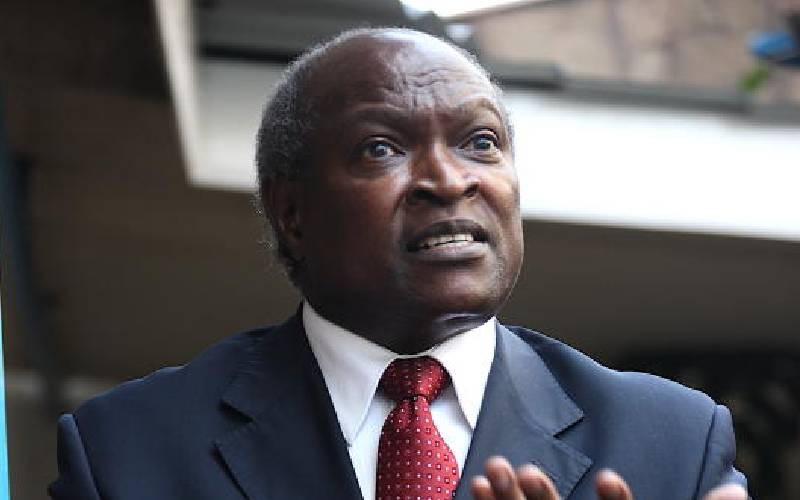Murkomen's 'Fuel Money' Scandal: Experts Warn of Normalised Bribery Risk

Interior Cabinet Secretary Kipchumba Murkomen recently stirred controversy with remarks urging Kenyans to be patient with police officers who sometimes request fuel contributions when responding to emergencies. Speaking at the Jukwaa la Usalama public engagement forum, Murkomen explained that each police station is allocated a capped amount of 450 liters of fuel per month. He noted that this allocation frequently runs out before the month concludes, especially in urban areas where officers are more actively engaged in crime prevention efforts. Murkomen clarified, “So please bear with the police officer if they ask you for fuel. It is not corruption or a demand for a bribe, it is simply a result of the current leasing program, which provides 450 liters per month.”
While the CS’s statement was presented as a simple explanation, experts and civil society organizations hold a contrasting view. Transparency International Kenya (TI) firmly stated that soliciting “fuel money” from citizens unequivocally constitutes corruption. According to TI, the Anti-Corruption and Economic Crimes Act defines corruption to include abuse of office, bribery, and fraud. Furthermore, the Bribery Act explicitly categorizes offering or receiving money in exchange for performing an official function as bribery. TI argues that asking for fuel money for police to fulfill their lawful mandate is a form of corruption, punishable under Kenyan law. They also pointed out that a cabinet secretary’s core duty is to provide policy direction and strengthen institutions, suggesting Murkomen’s remarks could be interpreted as legitimizing an illegal practice. TI warned that such a precedent would make access to justice dependent on a citizen's ability to pay, thereby undermining the Constitution and eroding the fundamental essence of government services.
Amnesty International Kenya Director Irũngũ Houghton echoed these serious concerns. He noted that even if Murkomen’s comments were well-intentioned, they are deeply unsettling for ordinary Kenyans, particularly those in marginalized communities. Houghton highlighted that many Kenyans already face coercion to pay bribes for services or to avoid harassment, and these remarks risk normalizing bribery within law enforcement. He articulated that the comments could justify services only when communities can afford to pay for 'fuel,' despite the Constitution of Kenya guaranteeing all citizens equal protection and fairness under the law. “Justice cannot be transactional and left to a citizen’s ability or willingness to pay,” Houghton asserted, cautioning that millions of Kenyans living below the national poverty line could be left vulnerable to neglect, abuse, or arbitrary arrest if such practices were allowed. He emphasized that the statement risks normalizing bribery and blurs the line between genuine logistical challenges faced by officers, criminal behavior, and the essential need for realistic budgeting for police services by various governmental bodies.
These concerns are supported by findings from the Kenya Bribery Index 2025, which indicated that the police ranked worst on the likelihood of bribery indicator, with a score of 72 percent, implying that 7 out of every 10 Kenyans interacting with police encountered a bribery situation. On prevalence, the police again performed worst with a 51 percent score, meaning that in every two bribery situations involving the police, one citizen paid a bribe. Notably, 40 percent of all bribes reported in the survey were paid to the police. TI warns that legitimizing “fuel money” normalizes an already rampant vice, emboldening officers to demand bribes openly without fear of consequences, while simultaneously eroding public trust in government institutions. Houghton concurs, stating, “They significantly damage public trust. Citizens pay taxes in the expectation that institutions like the police will impartially uphold the law and protect their rights. When leaders appear to excuse misconduct, it undermines confidence in the entire criminal justice system.”
In response to the debate, TI has called for a transparent and participatory budget-making process within the National Police Service, advocating for officers to be involved in identifying needs at various stations to ensure allocations are realistic. Governance lawyer Javas Bigambo also stressed the urgent need for policy reforms to close this loophole. Bigambo questioned the implications of the CS’s statement, suggesting it could lead to police refraining from offering help due to 'no fuel' or exploiting the statement for 'mischief.' He concluded that it is crucial for the Ministry to establish policies that seal this gap before Murkomen's statement is misused. As the discussion continues, there is a prevailing fear that an endorsement like Murkomen’s would push access to justice further beyond the reach of struggling Kenyans and entrench corruption deeper within a service often identified as Kenya’s most corrupt institution.
You may also like...
Messi Mania Unleashed: Two Goals, One Assist as Inter Miami Obliterates Atlanta!
)
Lionel Messi delivered a sensational performance, scoring two goals and assisting one, as Inter Miami defeated Atlanta U...
Super Eagles Flight Terror: Mid-Air Scare Forces Emergency Landing!

Nigeria's Super Eagles faced a mid-air scare when their chartered ValueJet aircraft made an emergency landing in Luanda,...
Mutant Mania Unleashed: 'X-Men '97' Season 2 Gets 'Omega-Level' Updates and Teases Rogue-Magneto Romance!

Marvel TV boss Brad Winderbaum confirms the continuation of the Rogue and Magneto romance in <em>X-Men '97</em> Season 2...
Hollywood Loses a Legend: Diane Keaton Dies at 79, Industry Mourns Her Iconic Legacy

Academy Award-winning actress Diane Keaton has died at 79, sparking a wave of tributes from Hollywood stars and fans ali...
Botswana's Judiciary Under Siege: Non-State Actors Threaten Legal System

The Southern and Eastern Africa Chief Justices' Forum in Gaborone addressed critical issues of judicial independence and...
Shocking Death: Former Lostprophets Singer Ian Watkins Brutally Killed in Prison Attack

Ian Watkins, the disgraced former lead singer of Lostprophets and a convicted pedophile, has died at 48 after being fata...
Budget Bliss: Lidl's New Gadget Slashes Winter Bills by £275!

As colder weather sets in, Lidl is offering an affordable solution to combat household condensation and damp with its Tr...
Unveiled: Jennifer Aniston's Secret 29p Superfood for Staying in Shape!

Jennifer Aniston's diet secret, quinoa, is revealed to be a powerful superfood packed with health benefits. This gluten-...




